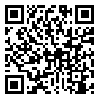Volume 15, Issue 4 (Paramedical Sciences and Military Health (winter 2021) 2020)
Paramedical Sciences and Military Health 2020, 15(4): 43-49 |
Back to browse issues page
Download citation:
BibTeX | RIS | EndNote | Medlars | ProCite | Reference Manager | RefWorks
Send citation to:



BibTeX | RIS | EndNote | Medlars | ProCite | Reference Manager | RefWorks
Send citation to:
Gholamhosseini L, Mehrabi N, Rezazadeh A, kabodian F. Evaluation of Barriers and Facilitators Affecting the Implementation of Electronic Health Records in Iran. Paramedical Sciences and Military Health 2020; 15 (4) :43-49
URL: http://jps.ajaums.ac.ir/article-1-234-en.html
URL: http://jps.ajaums.ac.ir/article-1-234-en.html
1- Department of Health Information Technology, Faculty of Paramedicine, AJA University of Medical Sciences, Tehran, Iran
Abstract: (3429 Views)
Introduction: Despite the development of information technology in the field of health, the process of creating and using electronic health records is still difficult. Therefore, identifying the implementation barriers of this system contribute to eliminate them and adopt effective implementation strategies.
Methods and Materials: The present study is a review article and the research population included documents related to barriers and facilitators affecting the implementation of electronic health records. Databases were searched in SID, Iran Medex, Magiran and Google Scholar search engine. Only 14 sources were reviewed among the 152 recovered sources. For this purpose, the draft data collection form was designed in Excel software. The validity of the final form was approved after receiving the opinions of experts and making the necessary corrections. Then, the selected sources were entered based on the objectives of the study in the data collection form. After that, the narrative analysis was performed.
Results: The most important implementation barriers in performing the EHR are the attitudinal and behavioral limitations of individuals and organizational changes. Thus, paying attention to education and the health care providers participation in implementing is essential to ensure that they have the right attitude. If system users know about the features, objectives, benefits and positive impact of the EHR on their work and they consider the standards related to data confidentiality as well as the ability to exchange messages, their resistance to the changes will decrease and their interest and readiness to accept the EHR increases.
Discussion and Conclusion: Findings indicate that employing a team of experts in different areas, implementing essential education technical provision for performing EHR along with allocating financial resources can help overcome barriers to the adoption of EHR.
Methods and Materials: The present study is a review article and the research population included documents related to barriers and facilitators affecting the implementation of electronic health records. Databases were searched in SID, Iran Medex, Magiran and Google Scholar search engine. Only 14 sources were reviewed among the 152 recovered sources. For this purpose, the draft data collection form was designed in Excel software. The validity of the final form was approved after receiving the opinions of experts and making the necessary corrections. Then, the selected sources were entered based on the objectives of the study in the data collection form. After that, the narrative analysis was performed.
Results: The most important implementation barriers in performing the EHR are the attitudinal and behavioral limitations of individuals and organizational changes. Thus, paying attention to education and the health care providers participation in implementing is essential to ensure that they have the right attitude. If system users know about the features, objectives, benefits and positive impact of the EHR on their work and they consider the standards related to data confidentiality as well as the ability to exchange messages, their resistance to the changes will decrease and their interest and readiness to accept the EHR increases.
Discussion and Conclusion: Findings indicate that employing a team of experts in different areas, implementing essential education technical provision for performing EHR along with allocating financial resources can help overcome barriers to the adoption of EHR.
Keywords: Electronic Health Record, Implementation, Barriers, Facilitators, Health Information Technology
Type of Study: review |
Subject:
full articles
Received: 2021/01/9 | Accepted: 2021/01/25 | Published: 2021/03/20
Received: 2021/01/9 | Accepted: 2021/01/25 | Published: 2021/03/20
| Rights and permissions | |
 |
This work is licensed under a Creative Commons Attribution-NonCommercial 4.0 International License. |




